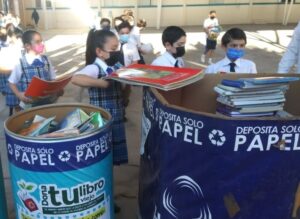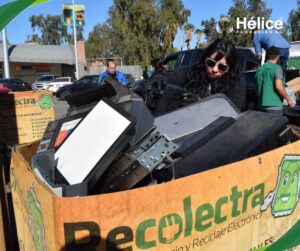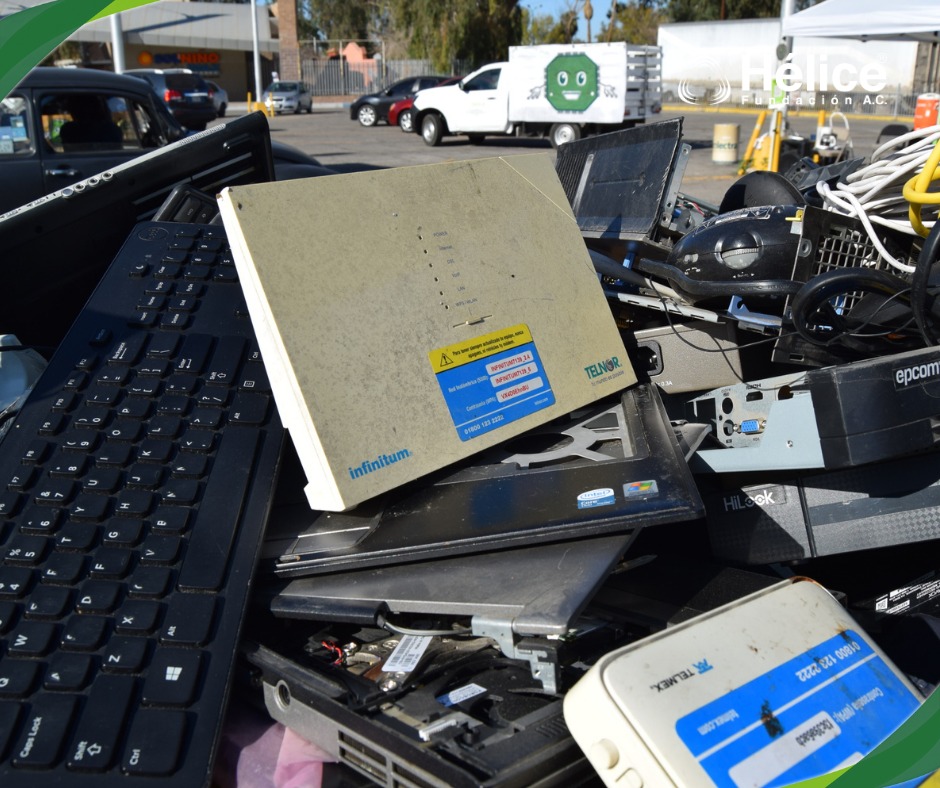In 2009, Helix Foundation A.C. was born in Mexicali as a project of environmental education focused on the handling and management of waste from offices, in order to contribute their grain of sand in generating a more responsible community, since then it has consolidated as one of the most recognized organizations in the country. Baja California.
Myriam Serra CastellanosThe President of Fundación Hélice, explains that since its inception, this civil association has recycled more than 5 thousand tons of wasteIn addition, its actions have resulted in savings of over 4 million liters of watertotaling more than 2,700 trees conserved and have had an impact on the collective by training more than 50 thousand people in environmental education.
Donate your book campaign, the mother campaign
Fundación Hélice has positioned itself socially with its mother campaign Donate your old bookwhich was born with a dual purpose: to capture paper, which was going to landfills, as a source of income, and to rescue those that could still be usable to be delivered to the State Library Networkwith which they signed an agreement, says Serra.
"We began to have on-site segregations in the collection campaigns, which were massive, and we began to rescue in each campaign around 3 thousand books, which went to contribute to the bibliographic collection, to reading rooms, to telesecundarias, to other institutions, so we began to generate a virtuous circle around the rescue of books. This campaign reaches about 120 tons of waste that we avoid sending to the landfill and that also serves to fund the environmental education campaigns of Hélice", he explains.

The President of the organization adds that subsequently the U.S. Environmental Protection Agency (EPA) invites them to work with a project of electronics to begin to influence society about the collateral effects of the handling of these devices.
"We started to work with formal and informal recyclers, with business chambers, we organized training courses, we also had a training course that leads to the R2 certification, which is a chain of custody that is followed from the producing companies, to the companies that disassemble or handle electronics, to the last link in the chain, which is the final disposal in an appropriate manner," he says.

Serra Castellanos states that Helix Foundation works with a recycler that adheres to R2 guidelines, which has allowed them to set up collection centers so that citizens can dispose of this waste free of charge.
"This network reaches more than 65 points in the city of Mexicali, not all are for electronic equipment, we only have two maritime containers that are located in public spaces and we are looking to expand this network of containers so that there is more accessibility and we reduce a little more this carbon footprint that we are generating by disposing of waste in landfills, which is what we estimate to reach," he emphasizes.
Disused electronic devices and batteries are a problem
Incorrect handling of electronic devices y disused batteries represent a problem not only for the environment, but can also be detrimental to health, emphasizes Myriam Serra.
Studies show that handling a screen with leaded glass can cause this substance to enter the bloodstream if it is not done with proper care and protective equipment, he says.
"The mishandling of this equipment, which contains lead, cadmium, arsenic, can damage not only the person who handles it, but by sending it to a landfill you are multiplying the exposure of the material. In Mexico we have many open-air landfills and not having geomembranes, adequate cells, causes filtrations into the aquifers," he says.
It is from these sources that water is supplied to towns and cities, so these toxic substances can be consumed by humans, he explains.
A long road ahead
With an industrial park as robust as the one that has MexicaliThe 5,000 tons of recycled waste may not seem like much, but it is waste that was properly disposed of at the source and did not end up in landfills or landfills, he said.
"That is the success of the project and with this resource we were able to pay payroll, operation, advertising and the environmental education we provide, which has helped more than 50,000 students. We do need more allies, companies that want to join us and try to be part of this project," he acknowledges.
Serra Castellanos adds that the work he has been doing for the past 14 years Helix Foundation with companies, government institutions, educational institutions and other organizations has allowed progress to be made towards a culture of recycling which today is more pervasive in society and which generates a positive impact on the environment because it is waste that is given an appropriate use or even a second life.


